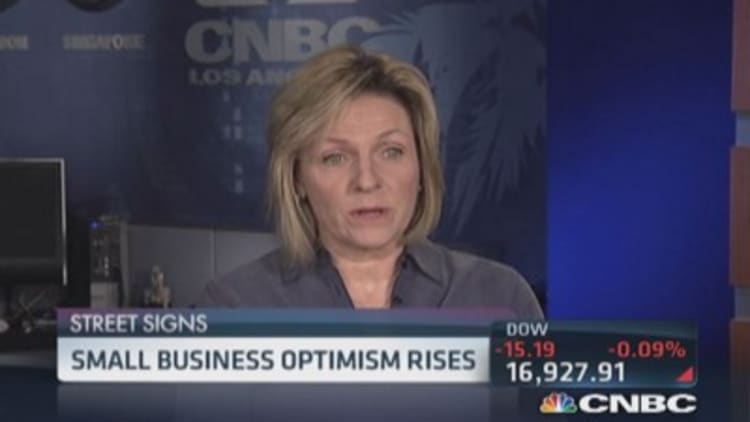Venus Hurst could have set up her two businesses almost anywhere. But she chose Detroit, Michigan, to run her international staffing agency, Venus Staffing, which she founded more than a decade ago, and Doll Face, a cosmetics start-up launched in 2011.
Hurst finds Michigan's environment very friendly to entrepreneurs like herself, thanks to programs like a property tax break the state makes available to commercial businesses like hers. The ease of doing business has freed her to focus on growing the staffing firm, which brings in about $500,000 in annual revenue.
"Michigan doesn't have too many regulations for small business," said Hurst. "You can get a tax break for just having a business here," she added, pointing to a property tax cut available to commercial businesses. Meanwhile, other entrepreneurs are flocking, thanks to efforts to revive Detroit following the city's bankruptcy filing last summer. "There are a lot of small businesses coming here," she said.
Read MoreA 2014 scorecard on how America's states stack up
At a time when many states are looking to attract job-creating businesses to their cities, more are getting serious about making themselves inviting to entrepreneurs. According to a recent study cited by the Kauffman Foundation for Entrepreneurial Leadership, 95 percent of municipalities offer some type of incentive to run a business within their borders. But given the number of states and localities offering incentives, they alone aren't always enough to attract entrepreneurial talent.
Here are five key attributes that states should offer if they hope to attract and retain small businesses.
1. Streamlined regulations
More states are realizing that entrepreneurs get discouraged quickly if there is too much paperwork to go into business and are paring down their bureaucracy. "What a lot of states and cities are doing is looking at how their operations are running and how they are delivering their services," said Mark Schill, vice president for research at Praxis Strategy Group. Schill was lead analyst on the annual enterprising states study, released earlier this month by the U.S.Chamber of Commerce to look at economic development across the country. Utah, he said, recently made a sweep to pare away dated regulations that slowdown small businesses.
2. Low overhead
When it comes to small-business creation, said Schill, "a lot of times the tax situation really drives the discussion." The Chamber of Commerce found that the states with the lowest state and local tax burden for businesses include Wyoming, Alaska, South Dakota and Texas.
Reasonable housing costs are important, too. "A lot of start-ups actually begin in someone's basement," said Howard Berkower, who advises many businesses as a partner in McCarter & English in New York City. For that reason he says, "They may want to be in a state with a very low cost of living."
Read MoreCheapest states to live in
The presence of affordable housing also makes it easier to find talent, particularly recent college graduates. "If you want to have entrepreneurship, you have to have things attractive to Gen X and Gen Y," noted Andrew Sherman, an attorney who advises many business clients as a partner in Jones Day in Washington, D.C., and an adjunct professor in the MBA program at the University of Maryland.
3. Abundant financing
One reason start-ups flock to California to work in places like San Francisco and Palo Alto—despite the fact that housing costs are exorbitant—is the abundance of investment capital available. It is hard to tap into that from a distance. "Angel investors and venture capitalists prefer to be somewhat close by," said Berkower.
The ability to get bank financing is important, too. Colorado offers the best access to small-business financing of all the states, according to the Chamber of Commerce's research.
4. A deep talent pool
A nationwide analysis by the Kauffman Foundation for Entrepreneurial Leadership has found that the presence of many educated workers is linked to increased entrepreneurial activity. That is particularly true for tech firms, which depend on highly educated engineering talent. "You are looking for good pools of people in terms of potential employees," said Berkower.
Read MoreMost innovative states in the US
One reason Colorado has such a healthy entrepreneurial economy right now, Berkower noted, is the large university community in Colorado Springs, home to a University of Colorado campus. Similarly, Texas benefits from the entrepreneurial economy that sprung up around University of Texas at Austin.
5. An energetic champion
It is hard for a state to compete in attracting small business if the governor is not bent on luring small businesses from other states, say experts. Texas Gov. Rick Perry, for example, is an aggressive champion of small business, noted Sherman, explaining, "He will fly directly into other states and hold seminars on doing business in Texas and aggressively recruit companies to come to Texas."
Individual cities within a state also need to have a champion, too, like venture capitalist Brad Feld in Boulder, Colorado, or it will be hard for a vibrant entrepreneurial ecosystem to take hold, Sherman said. "You've got to have a catalyst."
—Elaine Pofeldt, special to CNBC.com








